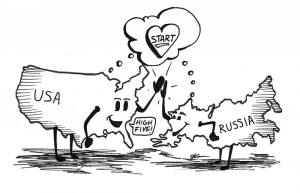START could repair American image
The New START Treaty, which limits the amount of strategic nuclear weapons that both the United States and Russia are allowed to have deployed at any time, was approved by the U.S. Senate in late December, overcoming its last hurdle.
The treaty fostered a contentious debate in Washington, but in the end, the treaty rightfully received 71 of 97 votes in the Senate, marking an important political victory for the Obama administration.
Opponents fear the treaty will ultimately prevent the United States from building strategic missile defense systems in Europe, and have argued that there wasn’t enough time to resolve this issue.
“When majority leader Harry Reid, [D-N.V.] asked me if I thought the treaty could be considered in the lame-duck session, I replied I did not think so given the combination of other work Congress must do and the complex and unresolved issues related to New Start and modernization,” said Sen. Jon Kyl, R-A.Z., in a written statement Nov. 16.
The next day, Sen. Richard Lugar, R-I.N., ranking member of the Foreign Relations Committee, spoke passionately against the idea of avoiding a vote during the lame-duck session.
“Every senator has an obligation in the national security interest to take a stand, to do his or her duty,” he told reporters in November.
Lugar was right to push for a vote, as the treaty is effective for the United States and its allies for multiple reasons.
To start, the treaty symbolically and diplomatically strengthens the relationship between the United States and Russia.
The Russian Federation still has important political, economic and military influence around the globe. Russian aggression to the current framework of the international system could also have a greater impact as the reach of U.S. foreign policy diminishes.
In the second decade of the 21st century, Russia’s international role will be significantly defined by its coalescence or its divergence with the United States and its allies. New START should allow the former enemies to work together on certain security issues, such as Iran.
The treaty also ensures that all United States and Russian nuclear materials are accounted for and under safeguards because it re-establishes continued on-site inspections and verification procedures of each sides’ nuclear facilities.
Inspections allow each side to be fully aware of their counterpart’s nuclear arsenal, while also providing greater assurance that all nuclear materials are accounted for.
New START will rightfully be implemented from the get-go. During his press conference Dec. 22, President Obama announced that U.S. inspectors would be back on the ground at Russian nuclear bases with the passing of the treaty.
The treaty sets the precedent that the reduction of nuclear stockpiles is a practical and realistic goal.
The international non-proliferation regime led by the International Atomic Energy Agency has moved slowly in implementing lasting changes beyond establishing a norm against the development and use of nuclear weapons. But reductions from the most powerful can lessen both the international threat level and a non-nuclear weapons state’s desire to proliferate.
“The [New] START Treaty is an important message to non-nuclear weapon states that the world’s two nuclear super powers are ‘working on it,’” Dr. Wayne Glass of USC’s School of International Relations noted in a written statement.
The treaty demonstrates how the United States can effectively dictate the international system to benefit the majority of the actors.
At the end of the Cold War, the United States assumed the international role of global moderator. Balancing its own self-interest and attempting to protect foreign citizens, the country has asserted itself militarily, exerting an unprecedented level of power around the globe.
The United States’ current economic struggles promise a much more diminished and restrained U.S. foreign policy. In the future, the United States will rely on others to help moderate the international system.
New START reflects this change. The Obama administration, along with the U.S. Senate, has acknowledged the need to strengthen global relationships.
Though New START is a step forward in the right direction, the United States must continue to extend its diplomatic hand to all potential allies in the interest of our security in the 21st century.
William Fay is a senior majoring in international relations. His column, “Facing our Global Challenges,” runs Wednesdays.

